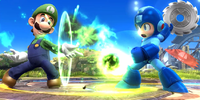Fireball: Difference between revisions
MeMyselfAndI (talk | contribs) |
MeMyselfAndI (talk | contribs) m (→Gallery: Fireball projectile) |
||
| Line 43: | Line 43: | ||
File:Mario Fireball SSB.png|Mario's Fireball in ''SSB64''. | File:Mario Fireball SSB.png|Mario's Fireball in ''SSB64''. | ||
File:Luigi Fireball SSB.png|Luigi's Fireball in ''SSB64''. | File:Luigi Fireball SSB.png|Luigi's Fireball in ''SSB64''. | ||
File:SSBM Mario Fireball.gif|Animation of Mario's | File:SSBM Mario Fireball.gif|Animation of Mario throwing a Fireball in ''Melee''. | ||
File:Fireball projectile SSBM.gif|Animation of Mario's fireball in ''Melee''. | |||
File:Ssbmmario4.jpg|Closeup of Mario's Fireball in ''Melee''. | File:Ssbmmario4.jpg|Closeup of Mario's Fireball in ''Melee''. | ||
File:Fireball.jpg|Mario's Fireball in ''Brawl''. | File:Fireball.jpg|Mario's Fireball in ''Brawl''. | ||
Revision as of 08:48, September 2, 2013
| Fireball | |
|---|---|
| Fireball Mario and Luigi throwing Fireballs in Melee. | |
| Users | Mario Luigi |
| Universe | Mario |
| Article on Super Mario Wiki | Fireball |
| “ | Shoot bouncing balls of fire horizontally. They vanish as they slow. | ” |
| —Melee's instruction manual | ||
| “ | Shoot a bouncing fireball that disappears once it loses speed. | ” |
| —Brawl's instruction manual | ||
Fireballs (ファイアボール Faia Bōru) are small projectiles launched by Mario and Luigi as their neutral special moves. Each travels a short distance, do minor damage and cause flinching common to fire-based attacks. The ball's trajectory changes according to the stage's surface angle upon contact, though with different results for each character. Mario's ability to shoot fireballs provides the design justification for his other fire-based moves in the Smash series.
In Super Smash Bros., both Mario and Luigi's fireball do 7%, while in Super Smash Bros. Melee, the fireballs' damage is decreased by 1%, only causing 6%. In Super Smash Bros. Brawl, Mario's fireball does 5% while Luigi's does 6%.
Fireballs were initially larger in Super Smash Bros., decreasing in size with Super Smash Bros. Melee and Super Smash Bros. Brawl in turn. As with all standard specials, Kirby can also use Fireball after inhaling either brother.
Users
Mario
Mario's red fireballs fall to the ground, losing momentum with each bounce. As such, they are more effective when fired from higher locations and toward downward slopes, traveling further. When firing at a wall or upward slope, the balls will bounce backward, a more defensive maneuver for brief protection from oncoming foes, perhaps in the air or from behind. Mario's fireballs can be spammed, though with some difficulty (and at a slower rate of fire than Luigi's), and are a decent approach tactic. The move can be more efficient when used in the air, falling to meet the enemy at ground level, while still moving, and negating lag.
Luigi

Luigi's green fireballs travel in a straight line and are unaffected by gravity (matching his floaty motif) and drift around in a circle, rather than rolling like Mario's. Also, despite the fact Luigi's fireballs are green, they still make red-orange burn animations upon impact on a character. They can be easily spammed, and can be fired at a slightly faster pace than Mario's, especially in the Negative Zone (Luigi's final smash). When firing at stage elements, the projectile's path will change based on the contact angle. As such, the move is more useful when used toward upward slopes, continuing on to foes. The move is more difficult to use on downward slopes, passing over enemies. Fireball approach is perhaps more difficult than with Mario, as the attack does not fall when used in the air. In general, Luigi's special attack is contextually less useful than Mario's, as it only travels in only one direction (forward), where Mario's move in two (forward, and downward). It also travels less distance. Luigi's fireballs deal slightly more damage than Mario's.
Origin
Fireballs were introduced in the game Mario Bros.. Red and green fireballs would periodically travel across the screen as hazards. The red fireballs moved in a random pattern, being affected by gravity, and the green fireballs moved in a straight path, not being affected by gravity at all. Only the green ones appear in Brawl's version of the stage, but they start out as red/purple before moving.
Although fireballs appeared in Mario Bros., the act of shooting fireballs originated in the 1985 NES game, Super Mario Bros., where the ability was obtained after collecting a Fire Flower. The power is lost when the player dies or takes damage. In the game, fireballs were small, traveled very quickly, and did not stop until hitting something. Also in this game, and other traditional Mario games, Luigi's fireballs are not unique, being red in color and behaving exactly like Mario's.
A fire flower would also change the character's clothing colors; Mario's overalls became red, while Luigi's turned green, both with white shirts and cap. These color schemes are available as alternate costumes for Mario and Luigi in Super Smash Bros. Brawl.






